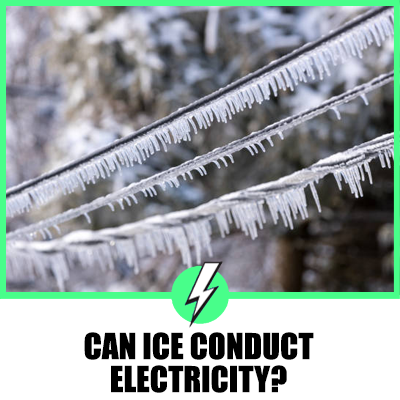Can Ice Conduct Electricity? A Comprehensive Analysis
The intriguing question of whether ice can conduct electricity has piqued the curiosity of scientists, students, and the general public alike.
At first glance, one might assume that since water, the liquid form of ice, can conduct electricity, ice should logically possess the same capability.
However, the scientific reality is far more complex and fascinating.
This article aims to delve into this topic, providing a comprehensive analysis that is accessible and engaging for both UK and US audiences.

Contents
Electricity and Ice
When electricity comes into contact with ice, the expected flow of current does not occur.
This is contrary to what happens with good conductors like copper or silver, where electricity flows freely.
The reason behind this lies in the fundamental requirements for the conduction of electricity – the presence and free movement of charged ions.
A Conductor or an Insulator?
Contrary to what some might expect, ice is not a good conductor of electricity.
In substances like tap water, charged ions are present due to the dissolution of salts and minerals.
These ions facilitate the flow of electricity.
However, when water freezes into ice, these ions no longer move freely.
This restricted movement of charged particles inhibits the flow of current, categorizing ice as a poor conductor of electricity.
The Electrical Resistance of Ice
The electrical resistance of ice is considerably high, further solidifying its status as a poor conductor.
The formation of ice involves the creation of a rigid crystalline structure, where water molecules form strong bonds with each other.
This rigidity restricts the movement of charged ions, thereby increasing ice’s resistance to the flow of electricity.
The Case of Dry Ice
Dry ice, the solid form of carbon dioxide, also does not conduct electricity.
Similar to water ice, dry ice lacks the free ions necessary to carry an electrical charge, making it a poor conductor.
Insights from Online Discussions
Online platforms such as Quora, Reddit, and Physics Stack Exchange host numerous discussions on this topic, providing further insights.
Many participants emphasize the necessity of free ions for the conduction of electricity, a requirement that ice does not meet.
They also discuss the rigid lattice structure of ice that prevents the free movement of ions, further inhibiting its ability to conduct electricity.
The Science Behind Ice and Electricity
To understand why ice doesn’t conduct electricity, we need to delve a bit deeper into the science behind it.
When water freezes, it forms a crystalline structure.
This structure is very rigid and doesn’t allow ions to move around freely.
In contrast, in liquid water, ions can move around more freely, allowing for the conduction of electricity.
Furthermore, the ions in ice are not free but are instead locked into the crystal structure of the ice.
This means that they cannot move around to conduct electricity.
This is in stark contrast to metals, where the outer electrons of the atoms are free to move and conduct electricity.
The Role of Purity
The purity of the water from which ice is formed also plays a significant role in its ability to conduct electricity.
Pure water, devoid of any impurities such as salts and minerals, is a poor conductor of electricity.
Consequently, ice formed from pure water, lacking in charged ions, is also a poor conductor.
Even ice formed from impure water, where one might expect the impurities to facilitate conduction, fails to conduct electricity.
This is because the freezing process locks the ions into the ice’s structure, preventing them from moving freely and conducting electricity.
Conclusion
In conclusion, the question of whether ice can conduct electricity opens up a fascinating exploration into the properties of matter and the nature of electricity.
While it might seem logical to assume that ice, being a solid form of water, would conduct electricity, the reality is quite different.
The lack of free ions and the rigid structure of ice make it a poor conductor of electricity.
This serves as a compelling reminder of the complex and often surprising nature of the world around us, where things are not always as they initially appear.





